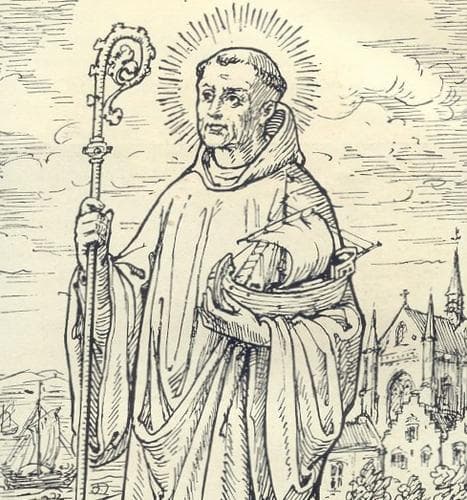
Blessed Idesbald Of Dunes
Blessed
Feast Day: April 18
Death: June 1, 1577
Biography
Blessed Idesbald of Dunes, also known as Idesbaldus or Isbaldus, was born around 1095 in Flanders, Belgium. Little is known about his early life, but it is believed that he came from a noble family. Idesbald served as a court page and courtier to the Count of Flanders in his youth, which exposed him to the intrigues and indulgences of the royal court.
In 1135, Idesbald underwent a profound religious conversion and decided to dedicate his life to God. He left his prestigious position and entered the priesthood, becoming a canon priest in Veurne, Belgium. However, his longing for a more contemplative and ascetic life led him to make a remarkable decision.
Idesbald resigned his position as a canon priest and joined the Cistercian order, renowned for its strict adherence to the Rule of Saint Benedict. In 1146, he was admitted as a monk at the Abbey of Our Lady of the Dunes, located on the sand hills between Dunkirk and Nieuport. This abbey, surrounded by the vast beauty of the dune landscape, provided an ideal setting for spiritual contemplation and solitude.
Idesbald quickly distinguished himself among the Cistercian community for his piety, humility, and dedication to the monastic life. His profound love for God permeated every aspect of his existence, and he embraced his new calling with great fervor. As a result of his exemplary conduct and spiritual insight, Idesbald was appointed as the abbot of the abbey after just a few years.
During his twelve years as abbot, Idesbald led his community with wisdom and grace. Under his guidance, the Abbey of Our Lady of the Dunes flourished as a center of monastic life, spiritual formation, and intellectual pursuits. Idesbald's reputation as a holy and compassionate leader extended beyond the abbey walls, and many sought his counsel and intercession.
Blessed Idesbald of Dunes is often represented in art as a monk holding an abbot's staff and a ship, symbolizing his role as both a spiritual guide and a protector of those who navigate the turbulent seas of life. His feast day is celebrated on April 18th each year, honoring his memory and the impact he had on the religious life in Flanders.
After his death in 1167, the remains of Blessed Idesbald were initially relocated in 1577 due to the threat of raiders who looted the abbey. They were then transferred again in 1623 for safekeeping. Remarkably, when his remains were discovered, they were found to be incorrupt, a phenomenon attributed to his sanctity. In 1796, during the French Revolution, his relics were relocated to Bruges to ensure their preservation.
Over the centuries, Idesbald's relics have been revered by countless devotees seeking his intercession. In 1830, his relics were moved to a chapel at Our Lady of the Potteries Abbey. A skeletal left arm of the saint is enshrined in the Diocese of Bruges, Belgium, while his skeletal right thigh was transferred and venerated in the Church of Notre-Dame of the Dunes Abbey on June 23rd, 1968.
Blessed Idesbald of Dunes was officially beatified by Pope Leo XIII on July 23, 1894, with his cultus confirmed. Although his life remains shrouded in some mystery, his unwavering devotion to the monastic life and his profound impact on the spiritual life of Flanders make him a revered figure in Catholic hagiography. His memory lives on as an inspiration to those seeking a deeper relationship with God and a life of holiness.